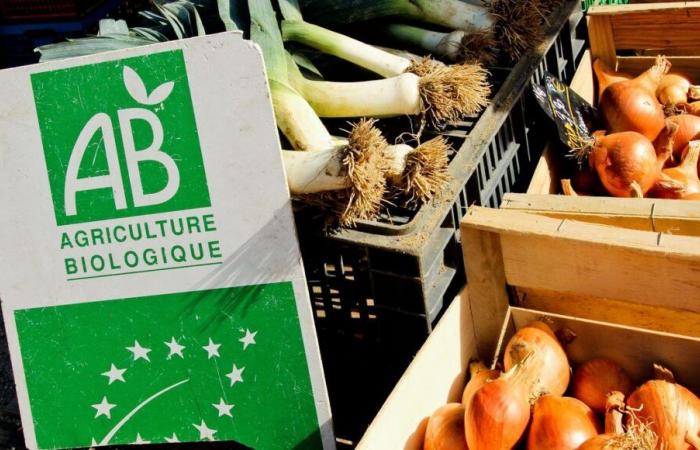As part of our partnership with the Journal Le Monde and its file dedicated to organic food and what science says, Aurélie Luneau receives its author, Stéphane Foucartjournalist from the Planète-Sciences editorial team of the newspaper Le Monde, co-author of an investigation, The guardians of reason, Investigation into scientific disinformation and author of The world is a valley, Chronicles 2013-2023, collection of his articles published twice a month, on the last page of the Monde for ten years;
Emmanuelle Kesse-Guyot, nutrition epidemiologist attached to EREN (Nutritional Epidemiology Research Team), research director at the National Research Institute for Agriculture, Food and the Environment (INRAE), researcher, co-investigator of the NutriNet-Santé study .
Francis Chateauraynaud, sociologist, director of studies at the School of Advanced Studies in Social Sciences (EHESS) and collection directorwho published, in the collection, Que sais-je, Alerts and whistleblowers.
Where to go from, how, on whom? Stéphane Foucart's investigation begins with this study carried out in 2017 by researchers from the Center for Biological Studies of Chizé, a commune in west-central France, in New Aquitaine, and the laboratory, Biogéosciences. They embark on an unusual study on the gray partridge and the effects of its diet, organic and non-organic, and after a few weeks of comparison, note effects on the immune system, on the size of the eggs, on the thickness of the shells, but also on their fatty accumulation, their plumage, their capacity for vigilance… And, from animals to humans, it is only a step…
Why a study on animals?
Stéphane Foucart recalls that animal studies have a somewhat special status in these questions of toxicology. “EIn particular, it is animal studies that allow pesticides to be marketed. That’s how we basically test pesticides, the active substances, before allowing them to be used.” He emphasizes that this is a study which is quite rare in principle, since there are very few recent studies on this subject, with this type of protocol where we ultimately try to reproduce the regulatory studies which are carried out with a pesticide, and we try to reproduce them with the classical mixtures of pesticides to which all humans are exposed through conventional food. Hence, a double interest.
Animal studies are the first to point out risks
“We can say quite easily that if these molecules are going to have particularly neurological effects on animals, there is little reason why exposure to these molecules on a daily, chronic basis, even if these are doses which are weak, ultimately, we can expect that there will be effects too, but this has rarely been studied until now.” Emmanuelle Kesse-Guyot
Large or small consumers of organic products and eating behaviors
Emmanuelle Kesse-Guyot evokes the study she conducted with Denis Lairon in 2013, where they really took a snapshot of the characteristics between large organic consumers and small organic consumers. “So there, we began to see a certain number of things at the same time on eating behaviors, lifestyles all these characteristics which will bring together a multitude of behaviors more beneficial for health among these large consumers of organic, and we have actually observed that these individuals, even when we took into account high physical activity, the fact of not smoking, etc., all these factors, these people had less obesity and less overweight. But it was a photograph of a given moment“.
“We don’t know if it’s this diet that causes overweight or obesity, or if, conversely, it’s because these people are overweight or obese that they will eat this way. ” (E Kesse-Guyot).
“We could not establish a sufficiently high level of proof because the study is cross-sectional, that is to say we do not know in which direction it works. We do not know if it is this diet which causes overweight or obesity, or if, conversely, it is because these people are overweight or obese that they will eat this way. So for that, we need longitudinal studies which will allow us to follow people who, initially, are in good health, record their diet and then see what happens.“. Emmanuelle Kesse-Guyot
The question of precautionary principles
Francis Chateauraynaud returns to a moment which was important at the end of the 90s, in Europe in particular, in France too: “the question of precautionary principles”. “What do we do when we have serious doubts about dangers, risks, threats, etc. that the evidence will take a long time to obtain and that there is dissensus in general between several coalitions of actors? The precautionary process had been established, it was even included in the preamble to the Constitution, making it possible to act without delay, that is to say to take transitional measures, to launch research precisely, to finance research. And to organize the public debate, so as to know who, ultimately, is concerned. That is to say, in this case, everyone.
Arsenic in rice, mercury in tuna, in short, pesticides in everything?
“There are alternatives, there are researchers making progress, there are also collectives. We are in a society that is still democratic. There are counter-powers. You have NGOs of all kinds. There are patient associations. We talk about diabetes, they are organized too. There are environmental associations, a certain number of which, some of which are very involved in these issues. There have been consumer associations for a long time, it's an old story too. And so all these actors play a fairly complex game, more or less well relayed by the media, depending on whether there are scandals. We have arsenic in rice, I think, mercury in tuna, in short, pesticides in things. And then it comes out, there it is, and there’s a shock.” Francis Chateauraynaud
We don't talk with our mouths full! Listen later
Lecture listen 29 min
Bibliography
- The guardians of reason: investigation into scientific disinformation – Stéphane Foucart, Stéphane Horel, Sylvain LaurensThe Discovery, coll. Free notebooks, 2020
- The world is a valley: chronicles 2013-2023 – Stéphane Foucartpreface by Jil Silberstein, Buchet Chastel, 2023
- Alerts and whistleblowers – Francis ChateauraynaudPUF, coll. What do I know?, 2020
- Role of nutrition in the prevention of chronic diseases: a public health issue – Mathilde TouvierCollège de France, coll. Inaugural lessons of the Collège de France, 2023 ( full text online)
- Sustainable agriculture, Volume III: Environment, nutrition and health – under the direction. by Marie-Luce Demesteer and Virginie Mercierpreface by Jacques Foyer, Presses universitaire d’Aix-Marseille, coll. Institute of Business Law. Economic law and sustainable development, 2020
- Eat and shut up: a nutritionist facing the agri-food lobby – Pr Serge HercbergHumensciences, coll. Debate, 2022
- The power of our plate: agricultural, food and land use transition: the Afterres scenario – Solagropostfaces Serge Hercberg, Frédéric Le Manach, Xavier Hamon, Utopia, coll. Ruptures, 2023
Bibliography: Vanessa Chang






